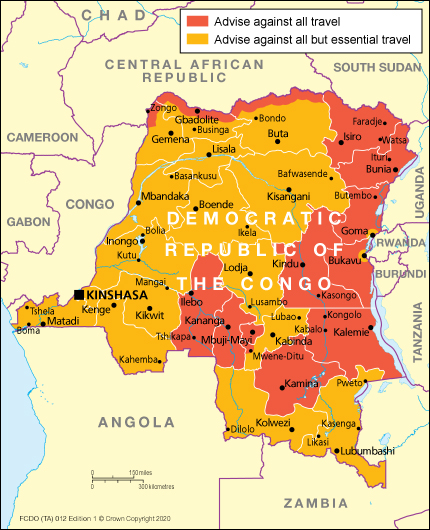
The Foreign, Commonwealth & Development Office (FCDO) advises against all travel to:
- the provinces of Kasaï, Kasaï Central, Kasaï Oriental, Haut-Uele, Haut Lomami, Ituri, North Kivu (except the city of Goma – see below), South Kivu (except the city of Bukavu – see below), Maniema and Tanganyika in eastern DRC
- areas to the west and east of Kananga, including Tshikapa and Mwene-Ditu (as shown on the map)
- within 50km of the border with the Central African Republic and South Sudan
The FCDO advises against all but essential travel to:
- the city of Goma in North Kivu province
- the city of Bukavu in South Kivu province
- the districts of N’djili and Kimbanseke in Kinshasa, both of which are south of the main access road to N’djili airport (located in Nsele district)
- the remainder of DRC based on the current assessment of COVID-19 risks
From 4am on 22 January, visitors who have been in or transited through Democratic Republic of Congo in the previous 10 days cannot enter the UK. British and Irish nationals, and third country nationals with residence rights in the UK arriving in the UK from Democratic Republic of Congo will need to self-isolate along with their household on their return. Check the latest guidance for England, Northern Ireland, Scotland and Wales.
From 1 January onwards people with residence rights include: holders of Indefinite Leave to Remain; holders of existing leave to enter or remain (i.e those with biometric Residence permits) or an entry clearance/visa that grants such leave e.g. students, workers, etc (excluding visit visas); holders of EU Settlement Scheme (“EUSS”) leave; those who have rights of entry under the Withdrawal Agreements (including returning residents with a right of residence under the EEA Regulations and EEA frontier workers); family members of EEA nationals with rights under the Withdrawal Agreement.
The FCDO is not advising those already travelling in Democratic Republic of Congo to leave at this time. Travellers should follow the advice of the local authorities on how best to protect themselves and others, including any measures that they bring in to control the virus. You should contact your tour operator or airline if you have any questions about your return journey.
Travel to DRC is subject to entry restrictions
- DRC’s borders are open and commercial flights to and from DRC are in operation.
- All travellers aged 11 and above need to present a negative coronavirus (COVID-19) test upon entry, dated within 7 days prior to your arrival
- In addition, all travellers aged 11 and above have to pay $45 USD for a mandatory test on arrival
See Entry requirements for more information before you plan to travel.
Preparing for your return journey to the UK
If you’re returning to the UK from overseas, you will need to:
Check our advice on foreign travel during the coronavirus (COVID-19) pandemic and sign up for email alerts for this travel advice.
If you’re planning travel to the Democratic Republic of Congo, find out what you need to know about coronavirus there in the Coronavirus section.
During the COVID-19 pandemic, it is more important than ever to get travel insurance and check it provides sufficient cover. See the FCDO’s guidance on foreign travel insurance.
The Embassy is not currently open to external visitors. It continues to carry out essential work including providing 24/7 consular assistance and support to British people in DRC.
Public gatherings and demonstrations can occur with little or no notice and can quickly turn violent. See Political situation
The security situation in eastern DRC remains unstable. There are continued reports of attacks and kidnappings. NGO staff have been known to be targeted. See Safety and security
Consular support is severely limited in parts of DRC. The lack of infrastructure throughout the country and insecurity in eastern DRC often prevent the British Embassy in Kinshasa from being able to extend normal levels of consular assistance to British nationals anywhere in the DRC other than Kinshasa. You should not assume that the FCDO will be able to provide assistance to leave the country in the event of serious unrest or crisis.
The Ebola outbreak in Equateur Province in DRC was declared over on 18 November. A separate outbreak of Ebola in eastern DRC was declared over in June 2020. Further information and updates on Ebola can be found on the WHO website and the Public Health England (PHE) website. Public Health England has guidance for humanitarian or healthcare workers travelling to countries at risk of Ebola. See Health
Street crime and robbery is common. You should avoid using any taxis in DRC. If you must take a taxi, use a privately booked one. Don’t hail taxis in the street. Beware of gangs promising you cut price gold and diamonds. See Crime
Terrorists are likely to try to carry out attacks in the DRC. Attacks could be indiscriminate. You should be vigilant, especially in places visited by foreigners. See Terrorism
If you’re abroad and you need emergency help from the UK government, contact the nearest British embassy, consulate or high commission.